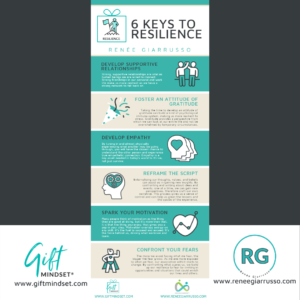Resilience is the strength of the spirit to recover from adversity. It enables us to find hope and the courage to continue, even when faced with tragedy or negative circumstances. Resilience isn’t a trait but, instead, a result of tapping into internal and external resources.
Three elements essential to resilience
Research published in the Journal of Humanistic Psychology showed that there are three elements essential to resilience:
- Challenge rather than crisis – resilient people look at mistakes and failures as lessons. They tend to reframe a paralysing event as a challenge. This in itself can change your mindset to be even more resilient.
- Commitment to goals – resilient people are committed in work, relationships, friendships, beliefs and things that they care about. Being committed will give you a compelling reason to get out of bed in the morning.
- Personal control – resilient people focus their energy and time, putting their efforts where they can have the most impact, and where they feel empowered and confident. Focusing on what we can influence allows us to stop worrying about events that are out of our control, which can make us feel lost and powerless.
The six keys to resilience

There are six skills needed to build resilience.
1. Develop supportive relationships
Strong, supportive relationships are vital, and as human beings, we are wired to connect. Strong friendships in our personal and work life make us more resilient as we have a strong network to fall back on.
2. Foster an attitude of gratitude
Taking the time to develop an attitude of gratitude can build a kind of psychological immune system, making us more resilient to stress. Gratitude provides a perspective from which we can look at our entire life and not be overwhelmed by temporary circumstances.
Click here to download your copy.
3. Develop empathy
By tuning in and almost physically experiencing what another may be going through, you will have the closest chance of understanding the other person and experiencing a true empathetic connection. Empathy is a key asset needed in today’s world to thrive, not just survive.
4. Reframe the script
Externalising our thoughts, values, and beliefs can assist us in gaining new insights. By confronting and writing about ideas and events, one at a time, we can gain new perspectives, therefore, craft our own narrative. This process gives us a sense of control and can help us glean the lessons and the upside of the experience.
5. Spark your motivation
Many people think of motivation as the thing they are good at doing, but it’s more than that. It is that the thing you enjoy; that gives you a pep in your step. Motivation overlays energy on any skill: it’s the fuel to succeed and exceed. It’s the force behind us, driving what we know and learn.
6. Confront your fears
The more we avoid facing what we fear, the bigger the fear grows. As we are more exposed to what we fear, our association with it starts to change. By confronting what scares us, we build up our resilience to fear by inviting in opportunities and situations that could enrich our lives and others.
How are you building on your Gift of Resilience?
Lead to be Limitless…


